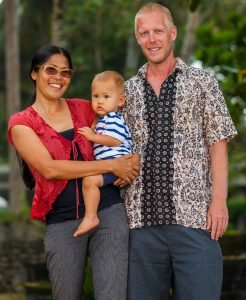Kelapa Retreat – Dream to Reality.
 Kelapa Retreat was planned as a forward-thinking blueprint. An example to future investors of how sustainable development in balance with the natural ecosystem and local community is possible. The hotel’s profits and integrated village projects support the local economy, raising the standard of living in this underdeveloped part of the island.
Kelapa Retreat was planned as a forward-thinking blueprint. An example to future investors of how sustainable development in balance with the natural ecosystem and local community is possible. The hotel’s profits and integrated village projects support the local economy, raising the standard of living in this underdeveloped part of the island.
Backpackers Gordon Hild and his future wife Ismayanti met in their youth while exploring the remote Indonesian island of Sulawesi in the late 90’s. Their love of nature and interest in culture and sport set the foundation of their life together.
In Bali, unplanned development had already become out of control. Locals lured into making a quick dollar had sold much ancestral land along with their ability to remain self sufficient. During their travels Ismayanti and Gordon had seen behind the surface glamour of mass tourism and the impact it has on nature and local communities.
Tourism infrastructure had sprung up and spread out like a cancer in the south in order to gain as much profit as quickly as possible, devouring rice paddies, thriving ecosystems and tearing communities apart all over the island as the younger generation flooded to the larger cities seeking employment.
Gordon became an expert in South East Asian studies with a focus on sustainable development and the Indonesian language.
Gordon and Ismayanti could see that imbalanced growth and uncontrolled development would end badly for Bali. What started as a dream slowly began to take form. They discussed a possible solution, sustainable hotels in remote underdeveloped regions with focus on community exchange. An exchange that would support both the tourist industry and enable members of the local community to realise their creative ideas, develop their own businesses and remain close to their families.
Balinese culture has a deep rooted focus on the balance of nature and community needs. Family support is a necessity to the sick and elderly as only a basic social security system exists.
Gordon and Ismayanti began to plan how they could make a difference. To develop a home away from home, a sustainable tourism project that gave back to the community and kept the real Bali and its nature intact. A vision away from quantitative mass tourism to one of sustainable qualitative development where ecological, societal, and economical needs are met and in balance with nature, without compromising the livelihoods of future generations.
While traveling together along the West Bali coastline in 2006, they came across a coconut grove for sale in a remote and pristine location, far away from mass tourism. They couldn’t believe their luck. Selling all their property in Germany, Ismayanti and Gordon Hild, together with Gordon’s parents and another friend invested their capital in the land and began to work closely with village heads and local residents. They discussed how the hotel could work in harmony with the community and local culture, utilizing skills and land to improve quality of life without unnecessary spending on the part of the village.
Although balance within nature is the essence of Balinese culture and religion, no education regarding its protection existed in the village. Rivers overflowed with plastic from religious offerings and mature trees were cut down without a second thought to future consequences.
In 2008, Gordon’s self-designed sustainable villas were built, creating as little negative impact on the surrounding ecosystem as possible. Coconut trees, some up to 70 years old were undisturbed where possible – there’s even one still growing happily through the roof at the end of the kitchen corridor! Local raw materials were utilized to reduce the need for transportation. White stone was chosen to reflect the heat and grey-green stone to blend the buildings into beach-front vegetation.
Porches and overhangs create buffer zones to reduce temperature, marble flooring and living roofs thermally insulate the villas against heat, keeping the interior cool.
The flat rooftops harvest rainwater which is stored in underground catchment tanks. The roofs resemble natural pools which reflect the sky and surrounding tropical vegetation – without hindering wider views of the ocean. Grey-water, from sinks, showers and baths is also reused in landscape irrigation.
Many other water features bring the Balinese temple cleansing element of water into the property and are a habitat and water source for animals. A creek in the forest part of the property also functions as a green-belt between hotel and village, guaranteeing absolute privacy for the guests. Tropical landscaping has attracted much more biodiversity to the area, such as butterflies, lizards and a much larger variety of birds.
This fusion adds to the unique atmosphere that inspires so many guests to return over again, recognising that there’s something different and very special there.
It’s not only the architecture and landscape which makes the project special and successful.
The local villagers are the real soul of Kelapa Retreat, employees trained by the owners, who have their natural Balinese hospitality intact and untainted due to not being trained in mass tourism hubs. They are forever being complimented by guests, who feel welcomed from the heart.
Many locals who built villas in the past now work as gardeners and security guards. One female construction worker is now nanny to Gordon and Ismayanti’s son. Younger employees, being more financially stable have settled down and started their own families.
Gordon and Ismayanti would like to introduce solar energy in the future, and are interested in meeting sponsors to help accomplish it.
Kelapa Retreat is so much more than a typical business focused on reaping revenue. It is a special sustainable project and long-term lifestyle program.
Over the last 10 years, Gordon and Ismayanti have established positive changes within the local community who view the hotel as a mascot which has influenced and improved many lives.

